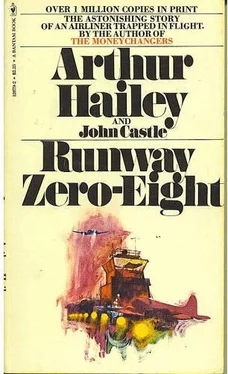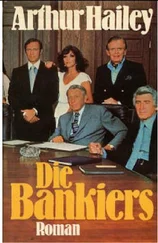Her husband seized frantically on the doctor’s presence.
“How is she?” he implored.
“She’s better off now than when she was conscious and in pain,” said Baird, hoping he sounded convincing. “When the body can’t take any more, nature pulls down the shutter.”
“Doctor, I’m scared. I’ve never seen her so ill. Just what is this fish poisoning? What caused it? I know it was the fish, but why?”
Baird hesitated.
“Well,” he said slowly, “I guess you’ve a right to know. It’s a very serious illness, one that needs treatment at the earliest possible moment. We’re doing all we can right now.”
“I know you are, Doctor, and I’m grateful. She is going to be okay, isn’t she? I mean—”
“Of course she is,” said Baird gently. “Try not to worry. There’ll be an ambulance waiting to take her to hospital immediately we land. Then it’s only a question of treatment and time before she’s perfectly well again.”
“My God,” said Childer, heaving a deep breath, “it’s good to hear you say that.” Yes, thought Baird, but supposing I had the common guts to put it the other way? “But listen,” Childer suggested, “couldn’t we divert — you know, put down at a nearer airport?”
“We thought of that,” answered Baird, “but there’s a ground fog which would make landing at other fields highly dangerous. Anyway, we’ve now passed them and we’re over the Rockies. No, the quickest way of getting your wife under proper care is to crack on for Vancouver as fast as we can, and that’s what we’re doing.”
“I see… You still think it was the fish, do you, Doctor?”
“At present I’ve no means of telling for certain, but I think so. Food poisoning can be caused either by the food just spoiling — the medical name is staphylococcal poisoning — or it’s possible that some toxic substance has accidentally gotten into it during its preparation.”
“What kind do you think this is, Doctor?” asked a passenger in the next row who had been straining to hear Baird’s words.
“I can’t be sure, but from the effect that it’s had on the folk here I’d suspect the second cause rather than the first — a toxic substance, that is.”
“And you don’t know what it is?”
“I have no idea. We won’t know until we’re able to make proper tests in a laboratory. With modern methods of handling food — and especially the careful way in which airlines prepare food — the chances of this happening are a million to one against. We just happen to be unfortunate. I can tell you, though, that our dinner tonight didn’t come from the usual caterers. Something went wrong owing to our late arrival at Winnipeg and another firm supplied us. That may or may not have a bearing on it.”
Childer nodded, turning the conversation over in his mind. Funny how people seem to find comfort in a medical man’s words, Baird reflected in a sardonic appraisal of himself. Even when what a doctor has to say is bad news, the fact that he has said it seems to be reassuring to them. He’s the doctor; he won’t let it happen. Maybe we haven’t come so far from witchcraft, he thought to himself with a touch of anger; there’s always the doctor with his box of magic, to pull something out of the hat. Most of his life had been spent in nursing, coaxing, bullying, cajoling — reassuring frightened and trusting people that he knew best, and hoping each time that his old skill and sometimes very necessary bluff had not deserted him. Well, this could be the moment of truth, the final, inescapable challenge which he had always known would face him one day.
He felt Janet standing beside him. He questioned her with his eyes, sensing her to be on the edge of hysteria.
“Two more passengers have been taken ill, Doctor. At the back there.”
“Are you sure it isn’t just the pills?”
“Yes, I’m quite sure.”
“Right. I’ll get to them straight away. Will you have another look at the first officer, Miss Benson? He might feel like a little water.”
He had barely reached the two new cases and begun his examination before Janet was back again.
“Doctor, I’m terribly worried. I think you ought to—”
The buzz of the galley intercom cut across her words like a knife. She stood transfixed as the buzz continued without a break. Baird was the first to move.
“Don’t bother with that thing,” he rapped out. “Quick!”
Moving with an agility quite foreign to him, he raced along the aisle and burst into the flight deck. There he paused momentarily, while his eyes and brain registered what had happened, and in that instant something inside him, something mocking in its tone but menacing too, said: You were right — this is it.
The captain was rigid in his seat, sweat masking his face and streaking the collar of his uniform. One hand clutched at his stomach. The other was pressed on the intercom button on the wall beside him.
In two bounds the doctor reached him and leaned over the back of the seat, supporting him under the armpits. Dun was swearing between his clenched teeth, quietly and viciously.
“Take it easy, now,” said Baird. “We’d better get you away from there.”
“I did… what you said…” Dun gasped, closing his eyes and squeezing the words out in painful jerks. “It was too late… Give me something, Doc… Give me something, quickly… Got to hold out… get us down… She’s on autopilot but… got to get down… Must tell Control… must tell…” His mouth moved silently. With a desperate effort he tried to speak. Then his eyes rolled up and he collapsed.
“Quick, Miss Benson,” called Baird. “Help me get him out.”
Panting and struggling, they pulled Dun’s heavy body out of the pilot’s seat and eased him on to the floor alongside the first officer. Swiftly, Baird took out his stethoscope and made an examination. In a matter of seconds Janet had produced coats and a blanket; as soon as the doctor had finished she made a pillow for the captain and wrapped him round. She was trembling as she stood up again.
“Can you do what he asked, Doctor? Can you bring him round long enough to land the plane?”
Baird thrust his instruments back into his pockets. He looked at the banks of dials and switches, at the control columns still moving of their own accord. In the dim light from the battery of dials his features seemed suddenly much older, and unbearably weary.
“You are part of this crew, Miss Benson, so I’ll be blunt.” His voice was so hard that she flinched. “Can you face some unpleasant facts?”
“I — I think so.” In spite of herself, she faltered.
“Very well. Unless I can get all these people to a hospital quickly — very quickly — I can’t even be sure of saving their lives.”
“But…”
“They need stimulants, intravenous injections for shock. The captain too. He’s held out too long.”
“Is he very bad?”
“It will soon become critical — and that goes for the others as well.”
Barley audible, Janet whispered, “Doctor — what are we going to do?”
“Let me ask you a question. How many passengers are on board?”
“Fifty-six.”
“How many fish dinners did you serve?”
Janet struggled to remember. “About fifteen, I think. More people had meat than fish, and some didn’t eat at all as it was so late.”
“I see.”
Baird regarded her steadily. When he spoke again his voice was harsh, almost belligerent.
“Miss Benson, did you ever hear of long odds?”
Janet tried to focus on what he was saying.
“Long odds? Yes, I suppose so. I don’t know what it means.”
“I’ll tell you,” said Baird. “It means this. Out of a total field of fifty-six our one chance of survival depends on there being a person aboard this airplane who is not only qualified to land it but who also didn’t have fish for dinner tonight.”
Читать дальше












